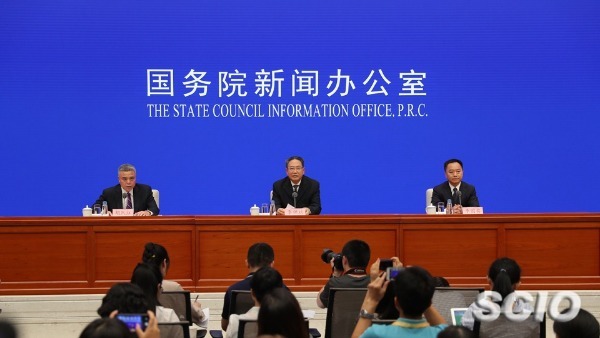Anhui: 70 years on

Editor’s Note: Starting in May, the State Council Information Office has been organizing news conferences for each province, autonomous region and municipality to give briefings about their social and economic development since the founding of New China 70 years ago.

During the Anhui session held Aug 14 in Beijing, Li Jinbin (center), secretary of the CPC Anhui Provincial Committee, and Li Guoying (right), governor of Anhui Provincial People's Government, talk about the province’s achievements over the past 70 years. [Photo/scio.gov.cn]
Economic Growth
The province’s GDP surged from 2.29 billion yuan ($327 million) in 1952 to 3 trillion yuan in 2018, up by a factor of 1,309. Per capita GDP increased from 78 yuan in 1952 to 47,712 yuan in 2018, an increase of 611 times.
Anhui has transformed from a major agricultural province to an emerging industrial province. In the early days after the People’s Republic of China was founded in 1949, the province’s primary industry accounted for over 75 percent of GDP, while industry only made up 7.9 percent. By 2018, the proportion of primary industry had shrunk to 8.8 percent and that of industry had expanded to 38.9 percent. Emerging industries such as smart home appliances, electronic information, new energy vehicles, industrial robots and artificial intelligence are flourishing, and advanced manufacturing has become the backbone of Anhui industry.
High-quality Growth
In 2018, Anhui granted 14,800 invention patents, more than 70 percent of which were from enterprises. The turnover of export and absorption technology contracts increased by 28.7 percent and 31 percent. Its regional innovation capability has been in the top tier nationwide for seven consecutive years.
By the first half of 2019, Anhui was home to 82 State-level enterprise technology centers and 1,306 provincial-level enterprise technology centers. The added value of high-tech industries accounted for more than 40 percent of that of industrial enterprises above designated size. The number of high-tech enterprises had surpassed 5,400.
People’s Livelihoods
The per capita disposable income of urban residents soared to 34,393 yuan in 2018 from 425 yuan in 1981. The per capita disposable income of rural residents jumped from 246 yuanin1981 to 13,996 yuan in2018. In 2018, the province’s growth rate of disposable income of urban and rural residents ranked third and fourth in the country. From 2014 to 2018, 4.42 million people in Anhui were lifted out of poverty and the incidence of poverty fell from 9.1 percent to 0.93 percent. Each year, more than 80 percent of newly added revenue has been allocated to improve people's livelihoods.
In 2018, the total grain output exceeded 40 million tons, maintaining a record 15 consecutive years of bumper harvests. The urbanization rate of permanent residents registered an average annual increase of 1.4 percentage points. More than 7,000 beautiful villages have been built or are under construction. Over 20,000 kilometers of rural roads have been built, and the road access rate of administrative villages is 100 percent.
Green Development
In 2018, the centralized treatment rate of domestic sewage in cities and counties in Anhui reached 94.9 percent and 94.6 percent. The average concentration of PM2.5 decreased by 12.5 percent year-on-year, and the ratio of good-air days was 71 percent, up 4.3 percentage points year-on-year. Investment in environmental protection and governance increased by 42.1 percent and energy consumption per unit of GDP decreased by 5.4 percent. Besides, there are more than 52,000 forest officials guarding nearly 4 million hectares of forest and more than 1 million hectares of wetland.
Better Business Climate
Anhui has been committed to optimizing its business environment and achieving the following goals: making Anhui one of the provinces with the least approvals, the highest efficiency, the best investment environment, and the strongest sense of gain for the people and market entities.
In 2018, provincial-level administrative licenses were reduced to 197, making Anhui one of the most business-friendly provinces in China. Over 30,000 cadres were dispatched to offer help to more than 330,000 enterprises in funds, talents and technology. In the first half of 2019, the number of newly registered private enterprises hit 161,000, up 28.8 percent year-on-year. The number of newly registered individual industrial and commercial households reached 229,000, an increase of 22.2 percent year-on-year.

From Xiaogang village, the birthplace of China's rural reform, to Micius, the world's first quantum satellite, Anhui has undergone historic changes over the last seven decades, transforming from a major agricultural area to an innovation hub. Innovation has become one of Anhui's greatest advantages, its shiniest image and strongest note. [Photo/VCG]
MOST POPULAR
- 1 Record trade bodes well globally
- 2 China updates Catalogue of Encouraged Industries for Foreign Investment
- 3 China's commerce ministry to boost consumption, opening-up in 2026
- 4 China's auto production, sales rank first globally for 17th consecutive year
- 5 China remains world's largest online retail market for 13th straight year







